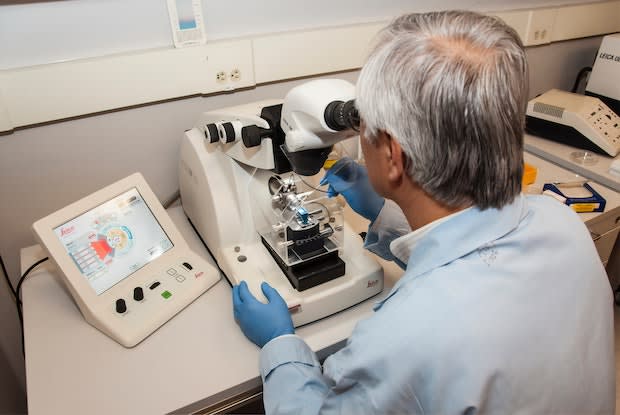Table of Contents
I. What Part of the Body Does UC Affect?
II. Symptoms of Ulcerative Colitis
V. Diagnosing Ulcerative Colitis
VI. Treatment Medications for UC
What Part of the Body Does UC Affect?
Ulcerative colitis (UC) is an inflammatory bowel disease (IBD) that affects the digestive tract. This condition causes ulcers and sores in the inner lining of the colon and rectum. UC does not typically occur suddenly but develops gradually over time. UC can lead to dangerous complications if left untreated, so it is important to seek medical intervention if you display symptoms. There is no cure for UC, but treatment medications like Medrol (methylprednisolone), Lialda (mesalamine), and Asacol (mesalamine) can provide symptom relief and potential for remission. [1]
Symptoms of Ulcerative Colitis
Ulcerative colitis can have many different symptoms. These symptoms will vary based on where the inflammation occurs and the severity of the condition. Some of these symptoms are mild, while others may be debilitating and impact everyday function. Common signs and symptoms of UC include:
- Abdominal pain
- Cramping
- Diarrhea with blood or pus
- Fatigue
- Fever
- Inability to defecate
- Rectal pain and bleeding
- Weight loss [1]
UC can be categorized into four different types based on the location of the condition. The first type is ulcerative proctitis, which is characterized by inflammation confined to the rectal area. Rectal bleeding is usually the only symptom of this type. The second type of UC is called proctosigmoiditis. This type involves inflammation around the rectum and the sigmoid colon, which is the lower end of the colon. If you have proctosigmoiditis, you may experience bloody diarrhea, abdominal cramps, and failure to defecate despite the urge to do so. The third type is left-sided colitis, characterized by extended inflammation throughout the rectum, sigmoid, and colon. Left-sided colitis affects a greater area, but its symptoms are mainly the same as proctosigmoiditis symptoms. Finally, the fourth type of UC is called pancolitis. This type affects the entire colon and causes fatigue, weight loss, and severe abdominal pain. [1] Your risk of developing ulcerative colitis depends on factors like age, ethnicity, and family history. UC usually begins before the age of 30, but it has been known to occur at any age, even past the age of 60. In children, UC may affect growth rates. [1] UC occurs less frequently in Asian and Middle Eastern populations than Caucasian people. The theory behind this finding is that UC is linked to richer and more industrialized countries. [2] However, ethnicity-related genetics can also increase the risk of UC; people of Ashkenazi Jewish descent are disproportionately affected by IBDs. [3] [4] If your parents, sibling, or child has UC, you are at a higher risk of developing it. This is because UC tends to run in families, especially among close relatives. Around 25 percent of those with UC have a parent or sibling with either UC or Crohn’s disease (another type of IBD). [5] The only way to definitively diagnose ulcerative colitis is through the use of endoscopic procedures with tissue biopsy. Endoscopic procedures include colonoscopy and flexible sigmoidoscopy. A colonoscopy allows your doctor to examine your colon using a small camera on the end of a thin tube. Your doctor will likely take a small sample of tissue (biopsy) during the colonoscopy for analysis. A flexible sigmoidoscopy uses a thin, lighted tube to view the rectum and the lower end of the colon (sigmoid colon). If the colon is severely inflamed, doctors will usually choose this procedure over a colonoscopy. [1] Two types of lab tests can be used to rule out infections caused by bacteria, viruses, and parasites. The first type is a blood test, which can determine whether you have enough red blood cells carrying oxygen to your tissues. The second type is a stool examination, where proteins in the stool are analyzed for signs of UC or infectious disorders. [1] Imaging procedures are useful for ruling out disease states similar to UC. If you have severe UC symptoms, your doctor may opt to use an x-ray scan of your abdominal area to rule out a perforated colon. A computerized tomography (CT) scan may be used to determine whether the colon is inflamed. Magnetic resonance imaging (MRI) is another effective and non-invasive way to examine the digestive tract and look for inflammation in the small intestine. [6] The first step of ulcerative colitis treatment typically involves the use of anti-inflammatory medications. The specific drug you are prescribed will depend on the part of the colon affected. Lialda (mesalamine) and Asacol (mesalamine) are both commonly prescribed anti-inflammatories. Mesalamine is a 5-amino derivative of salicylic acid and works by affecting various substances in the body responsible for inflammation, tissue damage, and diarrhea. [7] Corticosteroids can also be used to treat symptoms, but these drugs are generally reserved for more severe cases of UC. Corticosteroids tend to have side effects if used for extended periods, so they are only prescribed if your condition is not responsive to other forms of treatments. Medrol (methylprednisolone) is a steroid that can be used to treat many different inflammation-related conditions like lupus, psoriasis, and endocrine disorders. It is effective against ulcerative colitis because methylprednisolone can prevent the release of inflammatory substances in the body. [8] Living with ulcerative colitis can be difficult, but talking to your doctor can help. By working through your concerns and symptoms, you and your doctor can arrive at the best treatment plan for you. There are many more methods that can treat UC symptoms, such as immunosuppressant drugs, anti-diarrheal medications, pain relievers, and iron supplements. If you have ulcerative colitis, you may require more frequent screenings for colon cancer. Talk to your doctor about ulcerative colitis today. The content in this article is intended for informational purposes only. This website does not provide medical advice. In all circumstances, you should always seek the advice of your physician and/or other qualified health professionals(s) for drug, medical condition, or treatment advice. The content provided on this website is not a substitute for professional medical advice, diagnosis, or treatment.
Ulcerative Colitis Types
Possible Risk Factors

Diagnosing Ulcerative Colitis
Treatment Medications for UC

